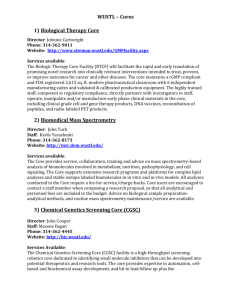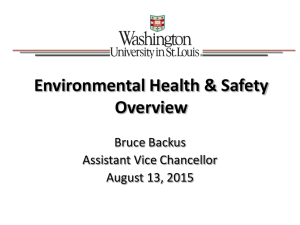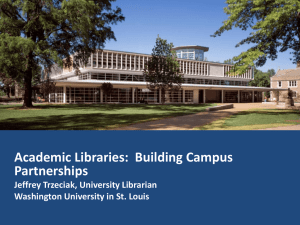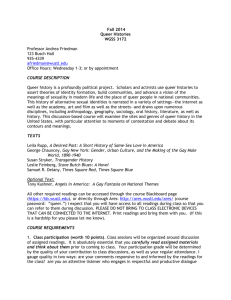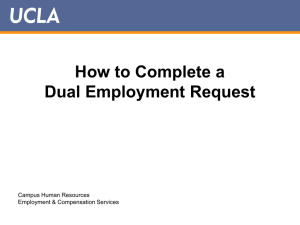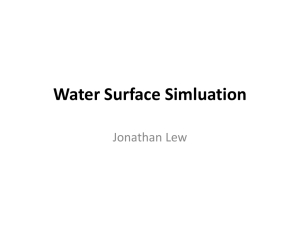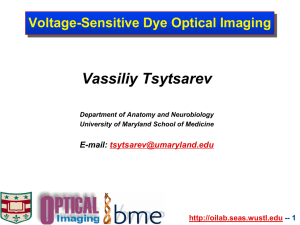Graduate School of Arts and Sciences
advertisement
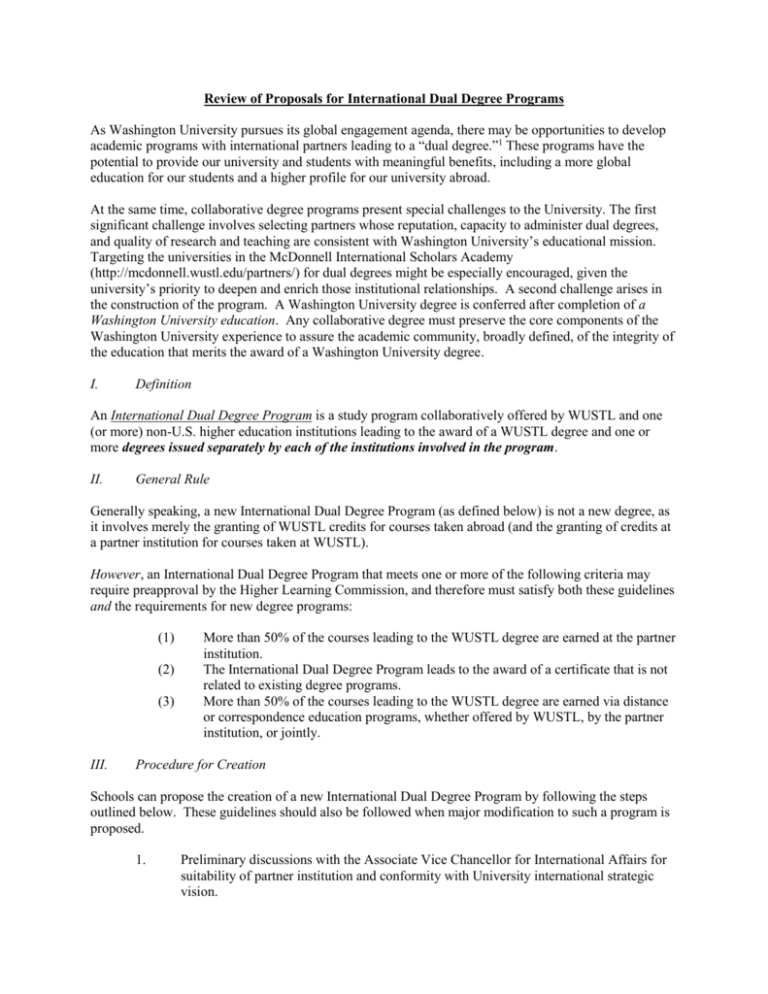
Review of Proposals for International Dual Degree Programs As Washington University pursues its global engagement agenda, there may be opportunities to develop academic programs with international partners leading to a “dual degree.”1 These programs have the potential to provide our university and students with meaningful benefits, including a more global education for our students and a higher profile for our university abroad. At the same time, collaborative degree programs present special challenges to the University. The first significant challenge involves selecting partners whose reputation, capacity to administer dual degrees, and quality of research and teaching are consistent with Washington University’s educational mission. Targeting the universities in the McDonnell International Scholars Academy (http://mcdonnell.wustl.edu/partners/) for dual degrees might be especially encouraged, given the university’s priority to deepen and enrich those institutional relationships. A second challenge arises in the construction of the program. A Washington University degree is conferred after completion of a Washington University education. Any collaborative degree must preserve the core components of the Washington University experience to assure the academic community, broadly defined, of the integrity of the education that merits the award of a Washington University degree. I. Definition An International Dual Degree Program is a study program collaboratively offered by WUSTL and one (or more) non-U.S. higher education institutions leading to the award of a WUSTL degree and one or more degrees issued separately by each of the institutions involved in the program. II. General Rule Generally speaking, a new International Dual Degree Program (as defined below) is not a new degree, as it involves merely the granting of WUSTL credits for courses taken abroad (and the granting of credits at a partner institution for courses taken at WUSTL). However, an International Dual Degree Program that meets one or more of the following criteria may require preapproval by the Higher Learning Commission, and therefore must satisfy both these guidelines and the requirements for new degree programs: (1) (2) (3) III. More than 50% of the courses leading to the WUSTL degree are earned at the partner institution. The International Dual Degree Program leads to the award of a certificate that is not related to existing degree programs. More than 50% of the courses leading to the WUSTL degree are earned via distance or correspondence education programs, whether offered by WUSTL, by the partner institution, or jointly. Procedure for Creation Schools can propose the creation of a new International Dual Degree Program by following the steps outlined below. These guidelines should also be followed when major modification to such a program is proposed. 1. Preliminary discussions with the Associate Vice Chancellor for International Affairs for suitability of partner institution and conformity with University international strategic vision. 2. Development of initial proposal by school, department, or program area, in conjunction with partners abroad (see guidelines below). 2. Submission to the Associate Vice Chancellor for International Affairs for review and discussion with appropriate personnel. 3. Approval by school specific oversight bodies, which may include the School’s Curriculum Committee, the faculty, the Dean, and the Graduate Council in the case of Ph.D. programs. Given issues such as residency requirements, it will be especially important that this review process address basic university as well as school specific guidelines. 4. Reduce all topics in the attached Guidelines to a written Memorandum of Understanding or similar document, signed by the appropriate authorities at all participating institutions. 5. Reporting of the program to the Provost. 6. The Provost informs relevant bodies including the Faculty Senate Council, the University Registrar and the Accreditation staff. GUIDELINES FOR PROPOSAL FOR INTERNATIONAL DUAL DEGREE PROGRAMS The proposal should address the following topics. These topics should be addressed in a written Memorandum of Understanding that is negotiated and signed by all participating institutions. I. OVERVIEW Describe statement of philosophy/purpose (the degree program is designed to...). Identify and briefly describe the partners: Which department or academic unit in the university, and what partner institutions (and academic units thereof) will administer the program. State how the degree program will serve the University’s and the unit’s academic mission. Summarize background. II. NEED FOR INTERNATIONAL DUAL DEGREE PROGRAM Specify what need(s), opportunities or audiences exist to justify a collaborative degree program. Describe areas of productive overlap or plans to collaborate across units, if appropriate. Describe the distinctive competence of the unit and the University for offering this program. Describe the distinctive competence of the partner institution for offering this program. Provide estimate of how many students are expected to participate in the program in its early years and in its steady state. Describe what efforts have been made to determine if there is a demand for such a program. III. PROGRAM REQUIREMENTS Outline the proposed curriculum for the degree program. Specify number of course hours. Describe areas of emphasis or concentration, if applicable. o Describe in particular any credits that will be granted towards Washington University degrees as a result of study at the partner institution. Specify if the program allows students to pursue additional programs (second degrees, minors, second majors, bachelors/masters combinations, etc.) either at the partner institution or WUSTL. Describe the procedures for credit transfer, including if applicable the procedure by which foreign credits will be converted to WUSTL credits and by which foreign credits will be incorporated into the WUSTL grade point average. Provide detail on whether this program will call for the creation of new courses or rely on existing courses and whether any program components are off-campus or include online education. List and describe required core courses, electives, and prerequisites and concentrations, if applicable. Outline if there are additional requirements outside of the curriculum for the degree program (etc. either at the partner institution or at WUSTL. Describe time line for coursework and other requirements. IV. SELECTION OF CANDIDATES AND ADMISSION CRITERIA List admission requirements, both for students admitted to the program through WUSTL and those admitted through the partner institution(s). Identify who will review applications and make admission decisions, both for students admitted to the program through WUSTL and those admitted through the partner institution(s). V. RESOURCES AND SUPPORT State how this new program will draw on existing faculty and resources (including library resources) or will provide new resources. Consider whether this new degree program will have an effect on other units in the university. List core faculty who will oversee the program. Include rank and department. State whether this new program will require additional resources and who will provide them. Consider issues of tuition and financial aid. In particular, describe how tuition and financial aid will be addressed during the period that a participating student is (a) in residence at WUSTL and (b) in residence at a partner institution. Consider issues of physical facilities, including on-campus or off-campus housing for students in residence at WUSTL and abroad. VI. PROGRAM ADMINISTRATION State which department or program will administer the program at WUSTL and at the partner institution. Identify Program Director or Coordinator at each institution. Describe process for evaluation of student performance, including any joint evaluation or evaluation for performance while not in residence at WUSTL. State plans for providing adequate advising, mentoring, and support of students in the program, in particular for maintaining continuity of advising, mentoring, and support between the institutions. VII. EVALUATION OF PROGRAM Describe whether the program satisfies the regulatory requirements applicable to the foreign institutions, including any university or national requirements applicable to joint or dual degrees. Describe how and how often program evaluation will be conducted. 1 An International Joint Degree Program is a study program collaboratively offered by WUSTL and one (or more) non-U.S. higher education institutions leading to the award of a single degree issued and signed jointly by WUSTL and all other institutions involved in the program. Joint degree programs are rare, require a complex approval process, and are generally discouraged. The following guidelines are for dual degree programs only. Please confer with the Provost’s office before entering into any discussions about possible joint degree programs. March 19, 2012
